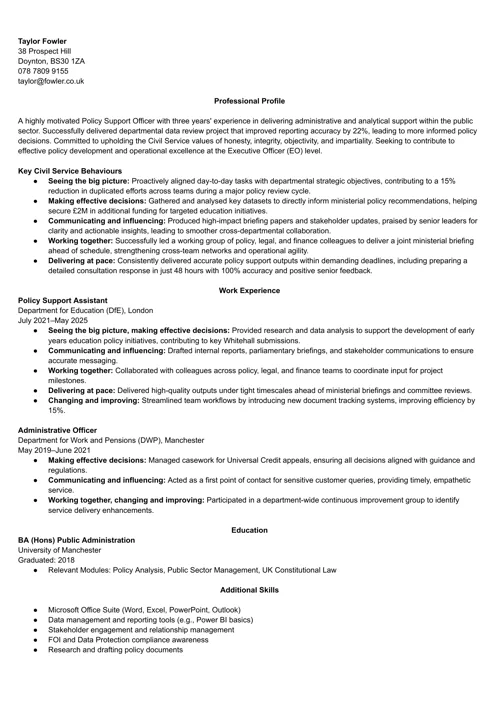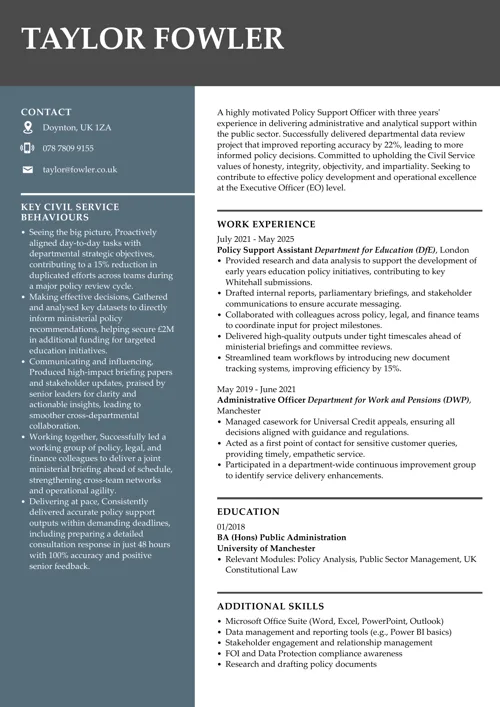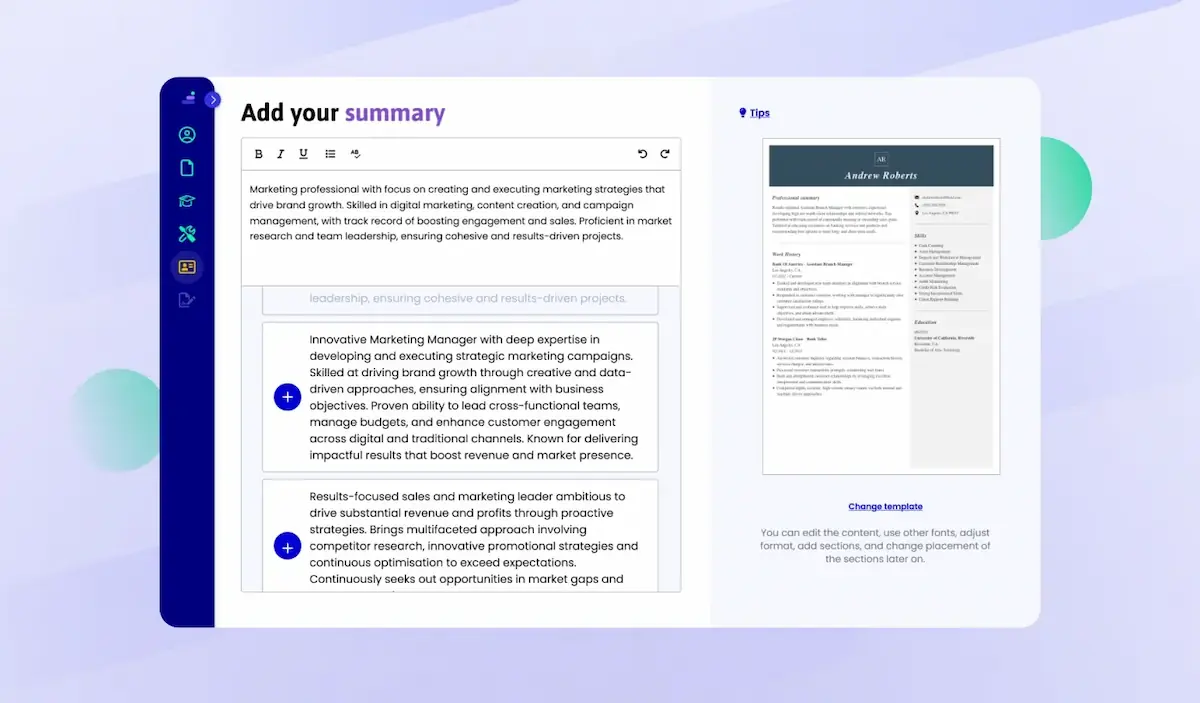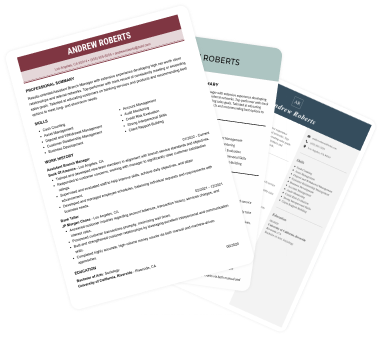Create a professional CV now!
 NO
NO YES
YESLast updated on 29 December, 2025

Our customers have been hired by*:
Imagine you're about to join one big team that runs the country, from policy planning to frontline services. To ensure everyone plays by the same rules, the UK Civil Service has outlined nine core behaviours defining how civil servants should approach their work. These are known as the Civil Service Behaviours.
They’re practical, people-focused standards that guide things like how you communicate, make decisions, and lead or support others. Recruiters will judge you on them whenever you apply for a civil service job. In this article, I’ll teach you everything you need to know about civil service behaviours.
Create an effective CV in minutes. Choose a professional CV template and fill in every section of your CV in a flash using ready-made content and expert tips.
Create a professional CV now!
 NO
NO YES
YESWe created the sample on the left using our builder. See other good CV examples like this one.
Civil Service Behaviours are a set of nine core behavioural standards used primarily in recruitment, appraisal, and development across the UK Civil Service. They focus on how civil servants deliver outcomes and interact with others: with integrity, honesty, objectivity, and impartiality.
They are also strongly connected to the concept of Success Profiles.
Success Profiles help recruiters assess you fairly by using different elements depending on the job:
It’s a more flexible and inclusive way to hire, ensuring that candidates with different backgrounds have a fair shot at success.
Behaviours are one key part of the Success Profiles system. When you apply for a job, the behaviours expected for that role will be listed clearly in the job description. You’ll need to showcase examples where you’ve demonstrated those behaviours either in your CV, personal statement, application form, or during the job interview. The interviewers will often score your answers based on how well you show the behaviours in action.
So basically:
Here are the 9 civil service behaviours together with their descriptions:
This is about understanding how your work fits into the larger goals of your department, government, and society. You're expected to be aware of long-term priorities, policies, and the impact of your actions even beyond your team.
This behaviour is all about being open to change, adapting when needed, and constantly seeking ways to improve how things are done. It involves embracing innovation and learning from feedback.
This one focuses on using evidence, data, and sound judgment to make well-informed choices. It means thinking critically, weighing options, and being confident in your decisions even under pressure.
Having leadership skills isn’t just about being the boss, but also setting a positive example, supporting your team, guiding others through change, and keeping people motivated. Even non-managers are expected to take ownership where relevant.
Practical communication skills are vital. This behaviour covers being clear, respectful, and persuasive, whether you’re speaking to colleagues, senior managers, or members of the public. It also means listening well and tailoring your message to your audience.
Teamwork skills are about building strong relationships, showing respect, and working cooperatively with people inside and outside your team. It includes being inclusive and managing conflict well when it arises.
Lifelong learning is key in the Civil Service. This behaviour is about taking responsibility for your growth while helping others improve through mentoring, sharing knowledge, or supporting team training.
This behaviour focuses on delivering results with accuracy and attention to detail. It involves understanding customer needs, prioritising workloads, and maintaining high standards in everything you do.
Delivering at pace means working efficiently, staying focused, and getting the job done on time without compromising quality, also known as having great time management skills. It’s about prioritising effectively and managing pressure well.
Below is a sample CV for a policy support officer position within the civil service:
Taylor Fowler
38 Prospect Hill
Doynton, BS30 1ZA
078 7809 9155
taylor@fowler.co.uk
Professional Profile
A highly motivated Policy Support Officer with three years' experience in delivering administrative and analytical support within the public sector. Successfully delivered departmental data review project that improved reporting accuracy by 22%, leading to more informed policy decisions. Committed to upholding the Civil Service values of honesty, integrity, objectivity, and impartiality. Seeking to contribute to effective policy development and operational excellence at the Executive Officer (EO) level.
Key Civil Service Behaviours
Work Experience
Policy Support Assistant
Department for Education (DfE), London
July 2021–May 2025
Administrative Officer
Department for Work and Pensions (DWP), Manchester
May 2019–June 2021
Education
BA (Hons) Public Administration
University of Manchester
Graduated: 2018
Additional Skills
Each section of this CV successfully presents civil service behaviours examples. Here’s how to achieve the same effect:
The CV professional summary references the Civil Service's core values of honesty, integrity, objectivity, and impartiality. Highlighting a quantified achievement shows an evidence-based approach, demonstrating both Making Effective Decisions and Delivering at Pace. It also signals an awareness of Seeing the Big Picture by linking outcomes to policy impact.
Similar to core competencies or a skills CV section, this section directly outlines specifics in a bulleted list format. Each behaviour is tied to a specific, measurable achievement, making it easy for a recruiter to see how this candidate operates in line with civil service expectations. Each point starts with an action word to create impact.
This candidate’s work experience neatly embeds civil service behaviours within practical examples from actual roles. In the Department for Education role, achievements are broken down by behaviour, showing what the candidate did and how it aligned with the Civil Service Success Profiles. Similarly, the DWP experience illustrates additional civil service behaviours, demonstrating growth from a more operational role into a policy-focused environment, which is typical for career progression at the EO grade.
To learn more about writing a CV for specific civil service jobs, see our guides:
The UK government provides HR success profile guides so you can learn in-depth about what civil service behaviours for your specific level should be like.
A strong CV summary will convince the recruiter you’re the perfect candidate. Save time and choose a ready-made personal statement written by career experts and adjust it to your needs in the LiveCareer CV builder.

Job interviews are often highly stressful. You never know what tricky situational job interview questions will stump you. That’s why I prepared a few job interview tips to help you present your civil service behaviours in the best light possible.
Question:
"Can you describe a time when you considered the wider implications of your work?"
Answer:
"While working at the Department for Education, I was responsible for analysing survey data on early years education. Rather than just focusing on the numbers, I made sure to understand how the data would inform larger funding decisions. I spoke with colleagues in policy and finance to see how our findings could be used strategically. I highlighted patterns, particularly around disadvantaged communities, which helped shape a policy proposal that ultimately secured £2 million in additional funding for targeted education support."
Question:
"Tell me about a time you suggested a change that improved a process or service."
Answer:
"In my previous role, I noticed that briefing documents were often delayed because there was no consistent version control. To improve the process, I introduced a simple but effective tracking spreadsheet and a version numbering system that everyone in the team could use. As a result, we reduced preparation time by 15% and made collaboration between departments much smoother, ensuring deadlines were met more reliably."
Question:
"Give an example of a decision you made using data or evidence."
Answer:
"At the Department for Work and Pensions, I managed Universal Credit appeal cases where decisions had to be evidence-based. In one case, the supporting documents were incomplete. Rather than making assumptions, I carefully reviewed what was available, cross-checked policy guidelines, and sought additional advice from a senior colleague. This thorough approach meant my recommendation was upheld without challenge, contributing to our high case accuracy rate."
"Describe a time you took the lead on a project or task."
Answer:
"When our team needed to compile a ministerial briefing pack on short notice, I stepped up to coordinate the effort. I assigned sections to colleagues based on their expertise, set internal deadlines, and ran regular check-ins to ensure we stayed on track. Thanks to this organised approach, we completed the pack two days early and received positive feedback from the Deputy Director for both quality and timeliness."
Question:
"Can you provide an example of when you had to communicate complex information clearly?"
Answer:
"I was tasked with presenting technical survey findings to a group of non-specialist stakeholders. To make the information accessible, I used clear visuals, avoided jargon, and focused on key insights rather than raw data. The feedback was very positive — several stakeholders later mentioned that the clarity of the presentation helped them make informed decisions about funding allocation."
Question:
"Tell me about a time you collaborated with others to achieve a goal."
Answer:
"During a policy review project, I worked closely with colleagues from legal, finance, and operational teams. We needed to pull together a comprehensive ministerial briefing on a tight timeline. I organised regular short meetings, encouraged open communication, and made sure everyone understood how their contributions fit into the bigger picture. By working collaboratively, we completed the briefing on time and ensured it reflected diverse expertise, which was highly valued by senior officials."
Question:
"Give an example of how you supported your own or someone else’s development."
Answer:
"When a new team member struggled with our document management system, I created a simple user guide and offered to run a quick lunchtime session for anyone who needed support. Not only did this help my colleague become more confident, but it also reduced overall system errors across the team by about 30%, saving time and improving the quality of our outputs."
Question:
"Describe a time when you ensured high standards in your work."
Answer:
"While preparing documents for a parliamentary committee, I knew accuracy was absolutely critical. I built in extra time for thorough quality checks, verified all sources, and asked a colleague to cross-review key figures. Thanks to this attention to detail, our briefing was submitted without any amendments and directly contributed to a well-informed committee session."
Question:
"Tell me about a time when you had to deliver work quickly under pressure."
Answer:
"I was once given an urgent Freedom of Information request that needed a full departmental response within 48 hours. I immediately prioritised the key pieces of data, coordinated inputs from different teamctas, and kept everyone updated on progress. By staying organised and focused, we submitted the response ahead of the deadline, fully compliant, and received praise from our legal team for the quality under pressure."
You don’t have to be a CV writing expert. In the LiveCareer CV builder you’ll find ready-made content for every industry and position, which you can then add with a single click.

And now you know the nine core Civil Service Behaviours and how to showcase them in your CV and during job interviews. Good luck in pursuing your chosen career path!
Our editorial team has reviewed this article for compliance with LiveCareer’s editorial guidelines. It’s to ensure that our expert advice and recommendations are consistent across all our career guides and align with current CV and cover letter writing standards and trends. We’re trusted by over 10 million job seekers, supporting them on their way to finding their dream job. Each article is preceded by research and scrutiny to ensure our content responds to current market trends and demand.
Category: Career Advice
Crafting a job-winning CV is all about showcasing your unique skills and experiences. Start with a strong personal statement that highlights your career goals and achievements.
Try Our CV Builder Now